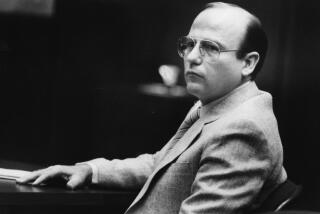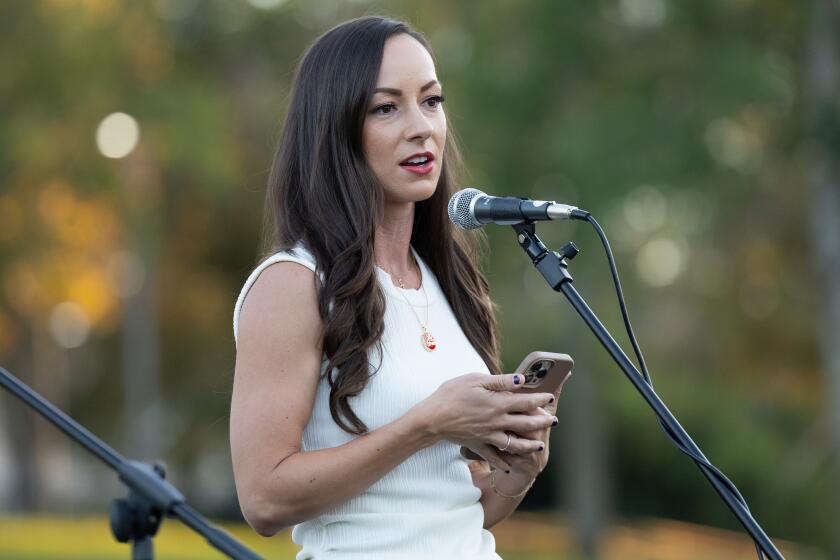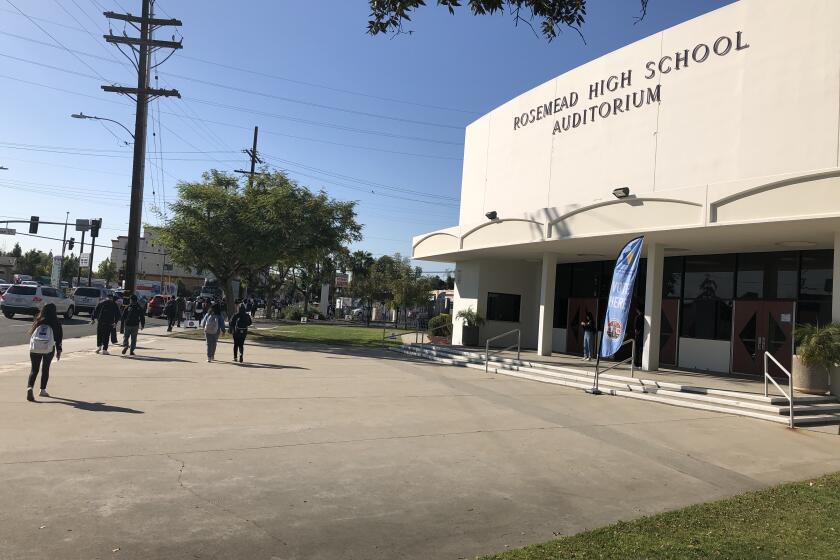UCLA Ponders Refusing All NEA Grants : Arts: University administrators and faculty are concerned about a requirement imposed on grantees that they sign the equivalent of an anti-obscenity oath.
UCLA officials plan to urge next week that the University of California administration allow them to turn down all grants from the National Endowment for the Arts this year, and will recommend the entire nine-campus UC system take the same action, The Times learned Thursday.
UCLA has received notification of two 1990 grants totaling $40,000, and has another nine pending requests totaling more than $700,000.
The recommendation, for which a background paper is being prepared for distribution to the remaining eight UC campuses, is the product of discussions among UCLA Chancellor Charles E. Young and top administrators of the university’s art galleries, performing arts center and School of Theater, Film and Television. The talks began about 10 days ago, according to Andrea Rich, UCLA’s vice chancellor for academic administration.
The discussions have focused, said Rich and a spokesman for UC President David P. Gardner, on concerns among UCLA administrators and creative arts faculty members over a requirement imposed on NEA grantees this year that they sign the equivalent of an anti-obscenity oath before they can receive grant funds.
It was also learned that NEA Chairman John E. Frohnmayer has written to members of the House and Senate, which are separately debating the legislative fate of the endowment, informing them that the NEA will implement three alterations in its grant-making procedures recommended by the U.S. General Accounting Office, which conducted a review of NEA procedures at the request of Sen. Jesse Helms (R-N.C.)
A copy of Frohnmayer’s letter to members of Congress, dated June 15, was obtained by The Times on Thursday. The NEA, however, reportedly remains committed to retaining the written anti-obscenity certification.
The proposed UCLA-UC joint action would move an already simmering controversy over the obscenity pledge to a new plateau and have implications for other arts endowment grantees across the country, many of whom have said in the last two weeks that they are grappling with the question of whether to accept NEA money this year.
Half a dozen NEA grantees, including the famed Bella Lewitzky Dance Company here, have already announced they will reject endowment support as a protest over what many arts organizations contend is an unnecessary restriction that interferes in creative freedom. One lawsuit has already been filed against the NEA over the language and Lewitzky announced last week she would also bring suit to try to have the obscenity oath declared unconstitutional.
“A group of us have been discussing this,” said UCLA’s Rich. “Some of us have very strong feelings about this. It is our sense that this is not something that UCLA can do unilaterally.
“We should not accept money from the government with those kinds of freedom of speech and expression constraints on it. As a public institution that stands for academic freedom, it would be just absolutely contrary to everything the institution stands for.”
Rich said the proposal would be made to the UC administration “next week or as soon as time allows.” She said a background paper was being prepared summarizing the development of the 14-month-old NEA political crisis and proposing the mass NEA boycott by the UC system.
Rich is also acting dean of UCLA’s School of Theater, Film and Television. She said a wide variety of UCLA facilities is affected by the NEA grant situation, including the university’s performing arts center, two art galleries, the motion picture and television archives and the university research library. It was not immediately clear what UCLA or UC would do to offset the short-term financial loss.
Young was said to be out of town Thursday and unavailable to comment. Gardner was out of the state, but William Frazer, UC’s senior vice president, issued a statement Thursday morning saying he and Gardner “are aware of the discussions that have taken place at UCLA,” and that “. . . this issue will be discussed over the next few weeks with the campuses.”
Frazer said he and Gardner had concluded they could implement a systemwide UC boycott of the arts endowment without approval of the UC Board of Regents, but that administrators had already decided not to take such a drastic step without informing the regents. There was no indication whether Gardner might authorize a UCLA grant rejection independent of a final decision on systemwide policy.
UCLA said it has received award letters from the arts endowment for two projects totaling $40,000 under the NEA’s 1990 grant program--which was specifically targeted by Congress for special restrictions on allegedly obscene work. The restrictions were enacted last year in response to controversial grants by the endowment to an art exhibit that included an image by Andres Serrano of a crucifix immersed in urine, and a show of photographs by the late Robert Mapplethorpe that included several sexually explicit images of nude men.
UCLA said it has nine additional NEA grants pending for this year, totaling $738,359. Rich declined to identify the nine grants, but it was learned that one of them is a $75,000 award to support an important exhibit of Chicano art being organized by UCLA’s Wight Art Gallery and scheduled to open to the public on Sept. 9.
Last year, UCLA received 12 NEA grants, totaling $803,400, the university said. UC and NEA officials were unable to immediately provide systemwide grant totals for 1989 because of problems in assembling data. The entire UC system got $1,092,000 from NEA last year.
The Wight gallery exhibit, “Chicano Art: Resistence and Affirmation,” is to feature more than 150 works of art by 90 Latino artists. The show, which has strong political overtones, focuses on the “complex relationship between the Chicano civil rights movement . . . and the art that was created in response to and in support of that movement,” according to a Wight gallery statement. Despite the financial implications for the show, Wight curators reportedly have supported the boycott proposal.
An NEA spokesman in Washington said the arts endowment had no statement in response to the possible UCLA and UC action. It was learned that some arts endowment program officials had been made aware of the UCLA discussions last week.
At the arts endowment, it was learned that Frohnmayer’s letter to Congress agrees to take three specific steps to alter NEA grant procedures in line with recommendations from the GAO. Specifically:
* The NEA will drop from its procedures an extraneous phrase in the obscenity oath included in the 1990 appropriation bill. The phrase, written by Helms, adds to language taken from a U.S. Supreme Court precedent obscenity ruling, superimposing an added condition that NEA-funded work must be judged by whether it includes “depictions of sadomasochism, homoeroticism, the sexual exploitation of children or individuals engaged in sex acts.”
* The endowment will change its procedures so that grantees that receive money to support entire seasons of work--by theaters, orchestras and ballet companies, for instance--would only risk NEA legal action to recover money for that part of their seasons’ work that might be judged obscene. A theater company that performed 10 plays in a year, of which one was judged obscene, would only have to return 10% of its grant.
* The NEA will establish a system so grantees can seek “advisory opinions” on whether work they propose to produce under endowment grants might be considered obscene at some time in the future.
More to Read
Start your day right
Sign up for Essential California for news, features and recommendations from the L.A. Times and beyond in your inbox six days a week.
You may occasionally receive promotional content from the Los Angeles Times.






